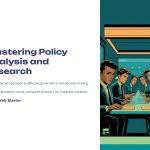 In today’s complex and rapidly evolving world, the role of policy analysts has become more crucial than ever. These professionals delve deep into societal issues, dissecting data and trends to inform decisions that shape our communities and nations. Understanding their function and examining real-world public policy case studies can provide invaluable insights into effective governance and societal advancement.
In today’s complex and rapidly evolving world, the role of policy analysts has become more crucial than ever. These professionals delve deep into societal issues, dissecting data and trends to inform decisions that shape our communities and nations. Understanding their function and examining real-world public policy case studies can provide invaluable insights into effective governance and societal advancement.

The Crucial Role of Policy Analysts in Modern Governance
Policy analysts serve as the backbone of informed decision-making within governments and organizations. Their primary responsibilities include:
- Identifying Policy Issues: Recognizing and defining problems that require governmental intervention.
- Research and Data Collection: Gathering relevant data through various methodologies to understand the scope and impact of issues.
- Evaluating Policy Options: Assessing potential solutions by analyzing their feasibility, costs, benefits, and potential outcomes.
- Advising Decision-Makers: Presenting findings and recommendations to policymakers to guide effective decision-making.
By systematically evaluating complex issues, policy analysts ensure that decisions are based on empirical evidence rather than conjecture, leading to more effective and efficient policies.

Methodologies Employed in Policy Analysis
To conduct thorough analyses, policy analysts utilize a variety of methodologies:
- Qualitative Analysis: Involves interviews, focus groups, and case studies to gather in-depth insights into societal issues.
- Quantitative Analysis: Employs statistical tools and models to analyze numerical data, identifying patterns and correlations.
- Comparative Analysis: Examines similar policies in different contexts or regions to draw lessons and best practices.
- Cost-Benefit Analysis: Weighs the expected costs against the anticipated benefits of a policy to determine its overall value.
These methodologies enable analysts to approach problems from multiple angles, ensuring comprehensive evaluations.

Case Study: South Korea’s COVID-19 Response
A notable example of effective public policy is South Korea’s response to the COVID-19 pandemic. The government’s strategy included:
- Rapid Testing and Contact Tracing: Implementing widespread testing and efficient contact tracing to contain the virus’s spread.
- Transparent Communication: Providing clear and consistent information to the public to maintain trust and compliance.
- Leveraging Technology: Utilizing digital tools for tracking infections and disseminating information.
This multifaceted approach resulted in relatively low infection and mortality rates without imposing extensive lockdowns, showcasing the impact of well-analyzed and implemented policies.

Challenges in Policy Analysis
Despite its importance, policy analysis faces several challenges:
- Data Limitations: Incomplete or unreliable data can hinder accurate analysis.
- Political Influences: Analysts may encounter pressure to align findings with political agendas.
- Resource Constraints: Limited time and funding can restrict the scope of analysis.
- Complexity of Issues: Multifaceted problems require interdisciplinary approaches, complicating the analysis process.
Addressing these challenges necessitates a commitment to methodological rigor, ethical standards, and continuous professional development.

The Future of Policy Analysis: Trends and Innovations
The field of policy analysis is evolving with emerging trends:
- Big Data Analytics: Harnessing large datasets to uncover insights and predict outcomes.
- Participatory Approaches: Engaging stakeholders and the public in the analysis process to ensure policies reflect diverse perspectives.
- Scenario Planning: Developing multiple future scenarios to prepare for uncertainties.
- Sustainability Focus: Integrating environmental and social sustainability considerations into policy evaluations.
These innovations are enhancing the ability of policy analysts to tackle contemporary challenges effectively.

Becoming a Policy Analyst: Skills and Qualifications
Aspiring policy analysts should cultivate the following skills and qualifications:
- Educational Background: A degree in public policy, political science, economics, or related fields.
- Analytical Skills: Proficiency in both qualitative and quantitative analysis techniques.
- Communication Skills: Ability to convey complex findings to non-expert audiences clearly.
- Critical Thinking: Evaluating information objectively to make reasoned judgments.
- Ethical Judgment: Upholding integrity and impartiality in analysis.
Developing these competencies prepares individuals to contribute meaningfully to policy development and evaluation.
South Korea’s COVID-19 Response
*Capturing unauthorized images is prohibited*







